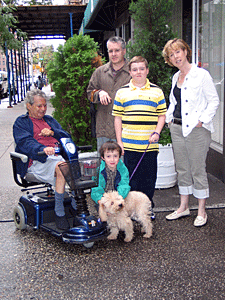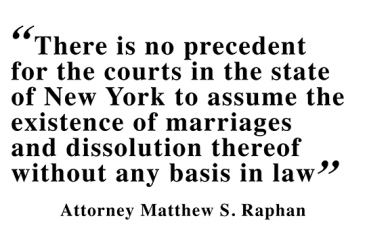There is a little-known program in New York City that’s helping to keep some senior citizens’ pets where they belong — in their loving homes, and out of animal shelters. It’s the JASA PETS Project, and it’s making a difference for many NYC seniors and their pets.
JASA PETS Project: Helping NYC Seniors and Their Animal Companions.

Following a heart bypass operation, Ms. B. — a former teacher who lives alone with Lady, her two-year-old Dachshund — was feeling isolated, depressed, and useless. Already involved with the JASA Pets and Elder Team Support (PETS) Project, a group of international students was recruited to help Ms. B. care for her dog. In return, she has begun to work with them to improve their English conversational skills. The connection with the students has restored Ms. B. into a vibrant, involved educator interacting with a group of students who, in turn, are helping her dog.
Ms. H. suffers with multiple sclerosis. Isolated and bedridden, she relied upon her two cats for companionship. Sadly, last year one of her beloved cats died and shortly thereafter, her other cat, Foxy, wandered outside her apartment building and disappeared. Distraught over the loss, Ms. H. contacted JASA PETS. The Project Coordinator immediately posted flyers throughout the neighborhood and dispatched a team of volunteers to search for the missing cat. After two days, Foxy found her own way home, and was discovered scratching at her door. Ms. H. was thrilled that her companion was safely home, but also profoundly appreciative for the support she received from the PETS Project team throughout the ordeal.
These are just two of the many heart-warming successes that have been created by JASA PETS. JASA, the Jewish Association for Services for the Aged, is a social service agency dedicated to enhancing the lives of elderly New Yorkers. It is committed to creating innovative programs to meet the evolving and expanding needs of the aging. JASA created the PETS Project in 1997 to address the needs of elderly pet owners whose capacity to care for their pets has been compromised by frailty, illness, and/or inadequate income.
In recognition of the critical role that pets play in the lives of older people — particularly those who are homebound — the program is designed to keep seniors and their pet companions together. Studies show senior citizens with pets suffer less from depression, require fewer doctors’ visits, and have lower blood pressure than those without animal companions.
Often, increasing age and declining health create obstacles to providing proper care for pets. Seniors afflicted with arthritis lose the ability to walk their dogs or groom long-haired cats; fixed incomes often cannot be stretched to cover routine veterinary bills; and pet owners with complex health problems may refuse hospitalization because they have no one to care for their animals in their absence.
How JASA PETS Can Help
The JASA PETS Project matches volunteers with elderly pet owners to provide assistance tailored to the needs of each client. By matching a volunteer with an elderly client, the program provides for the care and well-being of both the senior and the pet.
The client-volunteer teams are overseen by a full-time coordinator, a social worker with prior work experience in pet care, who conducts an initial in-home assessment and is fully involved in the service plan, including reviews of pet care routines. Volunteers help with dog walking, litter box cleaning, emergency feeding, shopping for pet food and supplies, transportation to veterinarians and groomers, training, and pet sitting.
In some instances, a skilled volunteer is able to assist with administering medication to sick pets. In addition, the program provides foster care during client hospitalization periods and participates in pet placement after the death of the human companion. A small relief fund has been established to assist clients who cannot afford to pay for needed pet services and/or their own expenses. The availability of this fund helps relieve financially strapped seniors from the need to make financial choices that compromise their health or the health of their pets.
The program also provides seniors with information about low-cost pet care and will help them make arrangements for their pets in their will. And it can assist in finding a good adopter for a pet if a client dies or can no longer keep a pet.
For some clients, the program helps them through one of the most difficult situations imaginable — the loss of a pet. Such was the recent case of Ms. M., an isolated, homebound client who agonized for several weeks over the difficult decision to put her terminally ill companion cat, Samantha, to sleep. The JASA PETS team visited Ms. M. regularly, coordinated efforts with two veterinarians, assisted in the planning for burial services, and called her daily to provide support. When Samantha died naturally on May 23, the PETS team was there within 30 minutes to console Ms. M. An informal but meaningful memorial service was held at her apartment, and the JASA team took Samantha’s body to the burial provider that had been designated by Ms. M. The team continued to provide bereavement support to help their client through the mourning period.
JASA PETS is making a difference in the lives of many seniors and their pets. The program has been praised by other organizations that serve the senior population. Mary Dodd, Director of the Homebound Unit of the Carter Burden Center for the Aging, says, “On behalf of the Burden Center, I would like to extend my gratitude to the Project. The Project provides unique and vital services to the most vulnerable and forgotten segment of our society. It is imperative that the program be celebrated and receive the continuing support needed to sustain its existence.”
Wendy Golub, Director of Programs at The Caring Community, says, “The PETS Project provides a unique service to the seniors in our community. We at The Caring Community have enjoyed and profited from working with them as they are not only responsible and reliable, but collegial and a pleasure to work with.”
The program is available to senior citizens — regardless of race or religious affiliation — who are sixty years of age or older and are unable to fully provide for the care of their pet companions. Currently, JASA offers this program to residents of Manhattan only. However, it is the aim of PETS eventually to expand the program to include the five boroughs.
To contact JASA PETS for services, simply call (212) 273-5217 to schedule a meeting at the client’s home. Once the client has provided information about the pet and any pet care concerns, the client will be matched with a volunteer to assist them in addressing those concerns.
If you are interested in volunteering for the JASA PETS Project or making a contribution, please contact Paul Domin, Project Coordinator, at pdomin@jasa.org or call (212) 273-5217.
The JASA PETS Project is funded by the Tuttle, Leibovitz, and Ahimsa Foundations.
– See more at: http://www.animalalliancenyc.org/media/ootc/2006-09/aao.htm#sthash.ZCRvYkuD.4t8krsYb.dpuf







You must be logged in to post a comment.